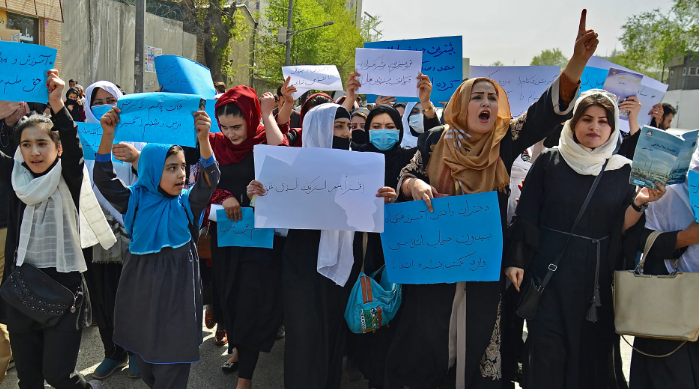Taliban Bans Books Written by Women in Afghan Universities
The Taliban government in Afghanistan has introduced another restriction targeting women. Universities across the country have been ordered to remove all books written by female authors. Along with this, subjects related to human rights, sexual harassment, and women’s issues are being cut from the curriculum.
This move is part of a larger policy where the Taliban claims such writings and subjects go against Sharia law and the government’s “core principles.” The decision has sparked criticism from writers, activists, and human rights defenders who see it as yet another attempt to erase women’s voices from Afghan society.
Hundreds of Books Declared “Problematic”
According to reports, a review committee examined the curriculum and labeled around 680 books as “concerning.” Out of these, more than 140 were authored by women. The Taliban declared that these texts cannot be taught or distributed in universities.
The committee also confirmed that from now on, any book written by a woman will not be allowed in higher education institutions. One member bluntly stated: “No book written by a woman can be taught.”
This marks the first time Afghan universities have seen such a sweeping, gender-based ban on academic material.
Subjects Now Prohibited
The restrictions are not limited to books. The Taliban has also banned 18 subjects from being taught at universities. Six of these are directly related to women’s studies, including courses like Gender and Development, Women’s Sociology, and The Role of Women in Communication.
Officials claim these courses are “in conflict with Islamic values and government policy.” Critics, however, argue that this is a way to stop women from learning about their rights and from participating in society.
The Pattern of Restrictions on Women
Since taking power in August 2021, the Taliban has rolled back almost every right Afghan women gained over the last two decades.
-
First, they closed secondary schools for girls beyond grade six.
-
Later, they banned women from attending universities.
-
Even courses that traditionally involved women, like midwifery and nursing programs, were suspended.
-
Now, even women’s writing is being erased from academic life.
Each step has narrowed the space for women to learn, work, and express themselves.
Voices of Shock and Resistance
Writers and former government officials have reacted with anger and sadness. Zakia Adeli, a former deputy minister of justice and one of the banned authors, said she was not surprised.
“This is the continuation of the Taliban’s policies against women. When women are not even allowed to study, it is normal for their writing and ideas to be censored too,” she told the media.
Human rights activists outside Afghanistan describe the ban as an attack not just on women, but on the entire education system of the country. They warn that Afghan universities risk falling further behind global academic standards.
Officials Defend the Decision
The Taliban’s Ministry of Higher Education defended the ban in a letter sent to universities at the end of August. Ziaur Rahman Aryoubi, the Deputy Director of Education, explained that a group of religious scholars and experts had carefully reviewed the texts before making the decision.
He said the purpose was to “protect students from material that conflicts with Sharia and the government’s values.”
In addition to banning women’s books, the Taliban also blocked works by Iranian writers and publishers. The review committee argued that this was necessary to “stop Iranian influence” in Afghanistan’s academic system.
A Step Toward Erasing Women’s Presence
Analysts believe the Taliban’s real goal is to gradually remove women from public and intellectual life. By banning their books, the government is not only silencing female voices but also discouraging future generations of women from pursuing education and creative work.
International observers fear this may lead to a “lost generation” of Afghan women, unable to access knowledge, skills, or representation.
International Reaction
So far, the international community has expressed concern but taken limited action. The United Nations has repeatedly urged the Taliban to reverse restrictions on women’s education, calling it a violation of basic human rights. However, the Taliban leadership insists that its policies are in line with Afghan traditions and Islamic law.
Human rights groups argue that silence or weak responses from global powers only embolden the Taliban to continue. They stress that stronger diplomatic and economic pressure is needed to protect Afghan women’s rights.
What This Means for Afghan Students
For male students, universities will continue to operate but with a narrower curriculum. For female students, the ban deepens an already desperate situation. Most young women in Afghanistan have been unable to study for more than three years. The new order ensures that even if restrictions are lifted someday, the knowledge and contributions of women writers will be missing from the official curriculum.
Conclusion
The Taliban’s decision to ban books written by women in Afghan universities represents more than a policy change. It is a clear statement about the government’s vision for society — one where women have no role in shaping knowledge, culture, or the future of the country.
For Afghan women, it is another painful reminder that their voices are being erased step by step. For the world, it is a test: will the international community continue to watch in silence, or will it take stronger action to defend the right of Afghan women to learn, write, and be heard?


